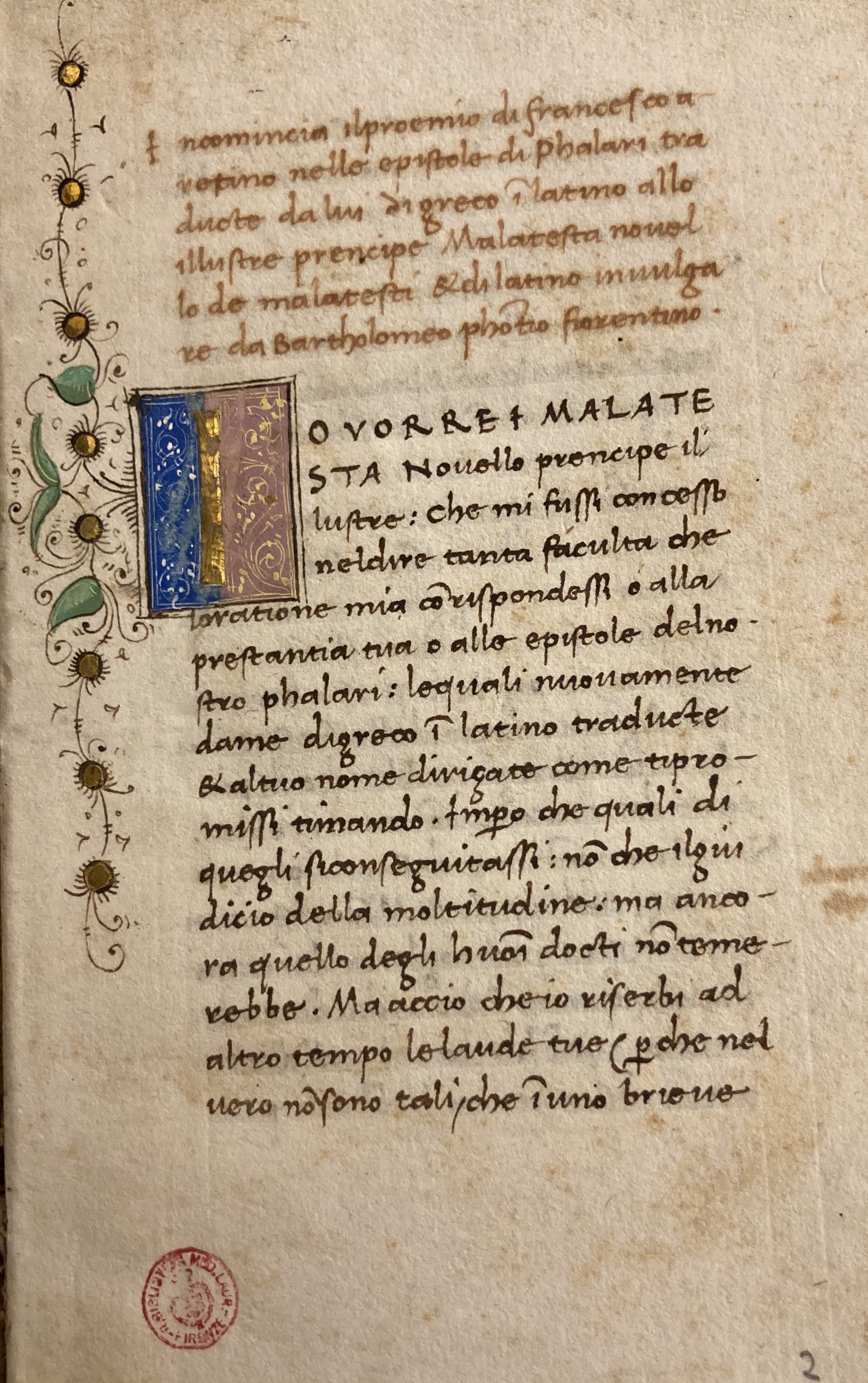About

The VerGreeR project aims to provide the first comprehensive narrative of the vernacular reception of Greek texts in Florence between ca. 1460 and 1500.
Among the broad variety of sources considered in the project, special attention is paid to the vernacularizations of Greek texts, which are the object of this database. Such vernacularizations were very often mediated by a pre-existing, intermediary Latin translation. This two-fold process of tanslation is for instance esplicitly declared by the Florentine translator Bartolomeo Fonzio (1447-1513), who in the late 1460s translated the Epistles of the pseudo-Phalaris based on Francesco Griffolini's Latin version of the text. By zooming into the picture on the right, it is possible to read the following declaration in the rubric: "Incomincia il proemio di Francesco Aretino [i.e. Francesco Griffolini] nelle Epistole di Phalari traducte da lui di greco in latino allo illustre prencipe Malatesta Novello de' Malatesti, et di latino in vulgare da Bartholomeo Phontio fiorentino" (Firenze, Biblioteca Medicea Laurenziana, Gaddi 141, fol. 2r).
Compared to other centres of the Italian Renaissance (such as Ferrara, Naples and Milan), the Florentine context has always been considered by scholars only marginally interested into vernacularizations of Greek texts. However, a thorough analysis of their little studied manuscript tradition shows that these texts had, at least in some cases, a lively and broad diffusion among a socially variegated readership (humanists, rich merchants, clergymen, office-holders, members of the lay middle-class of craftsmen).
This database will progressively collect the results of a first-hand analysis of all extant manuscripts that contain Florentine vernacularizations of Greek texts produced between ca. 1460 and 1500. In order to reconstruct the cultural milieu in which these vernacularizations circulated, attention will be paid in particular to the material features of each copy, as well as to any information on its ancient provenance (e.g. presence of coat of arms, ancient library shelfmarks, notes of ownership, annotations and other traces of reading). The printed tradition of vernacularizations will be also recorded in the database.
In order to reflect the two-fold process of translation that most frequently characterise Renaissance vernacularizations of Greek texts, the database includes also the textual tradition (in manuscript and in print) of the Latin intermediate translations that served as source texts for the subsequent translations into the vernacular.
The database is searchable by: Greek Work (Author-Title), Latin translation (Translator-Title), Italian Translation (Translator-Title), Translators (of a Latin or of a vernacular translation), Manuscript copy (of a Latin or of vernacular translation), Printed edition (of a Latin or of a vernacular translation). Free text search is also possible. The link between Greek works, Latin translations and vernacular translations is highlighted through a dedicated section in each entry, labelled as "source text". When exploring any Greek work or translation, it is possible to visualise all related translations (Latin or vernacular) by clicking on the links that appear in the section "Related translations".
VerGreeR is a 2-year research project based at the Centre for the Study of the Renaissance of the University of Warwick, and funded by a UKRI guarantee-Marie Curie Postdoctoral Fellowship (grant agreement n. EP/X021475/1, September 2023-September 2025). Research is led by Dr Cecilia Sideri as the researcher and holder of the grant, and supervised by Professor Paul Botley. The development of the website was led by Dr. Godwin Yeboah, Senior Research Software Engineer in Warwick Research Computing. The project started in September 2023, and the database is now being progressively populated with data collected during the first year of the project.
For any suggestion of improvement please contact cecilia.sideri@warwick.ac.uk.